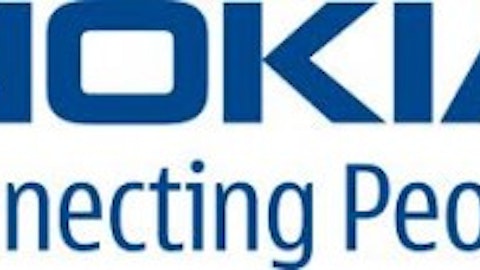While the old market saying is sell in May and go away, Bill Gross of PIMCO suggests that investors “gradually reduce risk positions in 2013.” In his typically fun-loving manner, the Bond King compared the risk of investing today to a Sweeney Todd haircut, which makes going away sound better than Gross’ advice. However, you can’t collect dividends if you aren’t invested. AT&T Inc. (NYSE:T), Verizon Communications Inc. (NYSE:VZ), The Southern Company (NYSE:SO), and Federated Investors Inc (NYSE:FII) are three solid names to consider for dividends and relatively low risk.

Bubble, Bubble
Bill Gross’ May commentary calls the current market environment a “central-bank-generated bubble.” As we’ve learned in the last 20 years or so, bubbles tend to end badly. So the best advice might be to sell everything, sit back, and watch. However, for those trying to live off of their dividend income, this isn’t an option. This is where Gross’ suggestion of reducing risk exposure comes into play.
While that can be hard to achieve in a “bubble” market, one way to get a modicum of safety is to stick with companies that offer necessities we can’t (or won’t) live without. The first thing that often pops to mind here is food and hygiene, but there are a few other bills that no one thinks about and always get paid: phone and electricity.
These are bills that we write a check for no matter what the total. And despite efforts to conserve, they usually don’t change all that much even when money is tight. Many customers simply let their phone and electric providers pull money directly from their bank accounts or credit cards, never even bothering to look at the expense until after it has been paid.
In fact, during the recession revenues at AT&T Inc. (NYSE:T) and Verizon Communications Inc. (NYSE:VZ) were largely unaffected by the economic slowdown. The Southern Company (NYSE:SO) saw a notable one-year dip, but the top line bounced back quickly as business spending returned. These three industry leaders in the utility space are worth looking at if sitting on cash isn’t high on your list.
The Darling Duopoly
AT&T Inc. (NYSE:T) and Verizon Communications Inc. (NYSE:VZ) are the two largest cell phone companies in the U.S. market. Although both still have material land-line businesses, their future is obviously in the mobile space. The good news is that mobile penetration is pretty high in The United States, so the duo’s market positions should be secure for years to come.
While technology advances could hurt them, competitors likely won’t. That said, with streaming video and music becoming more accepted, both should see a nice revenue push from increased data use even as competition for customers heats up in the saturated U.S. market. So technology changes aren’t a negative just yet.
The two companies, however, aren’t interchangeable despite their similarities. For example, AT&T Inc. (NYSE:T) has a long history of annual dividend increases while Verizon’s track record is less compelling, but in an upward direction. So, for income investors, AT&T’s dividend yield of nearly 5% is far more compelling than Verizon Communications Inc. (NYSE:VZ)’s sub 4% yield.
News has been the driving force at Verizon Communications Inc. (NYSE:VZ), which is openly talking about buying the 45% of Verizon Wireless it doesn’t own. That would be great for the company, but expensive. The share price run up may be premature. Still, it is a good company with a solid business. More aggressive types might prefer it to AT&T Inc. (NYSE:T) because of the potential that owning all of its mobile arm might offer.
A Stable Giant
The Southern Company (NYSE:SO) has over 4 million customers in four southern states and a conservatively run merchant power business. The merchant power arm is fairly small, so it best to view Southern as a standard utility. It has a long history of regular dividend increases.
An around 4% dividend yield may not be super exciting for a utility, but The Southern Company (NYSE:SO) has a lot going for it. For example, it operates in growing markets and has good relationships with its regulators. Also, the company is building new, high-tech power plants, including nuclear and coal gasification plants. Both are large, costly projects, but have great appeal over the long term.
The Southern Company (NYSE:SO) has proven itself to be the type of utility that you own and forget about. Collecting a 4% yield along way isn’t too bad for a rock solid utility, either.
Cash is King
Federated Investors Inc (NYSE:FII) is an interesting story in the finance world. Although it has been working to increase its size in the equity and bond markets, money market accounts still represent its largest business. These are notoriously low margin products, but relatively stable ones.
Money market funds are very similar to utilities in that few investors ask about how much a money market fund costs. Customers simply assume that a money market fund is available for their cash when it isn’t invested in stocks.
If the equity markets tank, the company’s assets under management (AUM) won’t be as hard hit as more heavily stock and bond focused competitors. In fact, if investors sell assets and hold cash, the company may actually see an increase in AUM. That makes this a bit of a contrarian play because of the utility-like nature of money market funds.
Federated Investors Inc (NYSE:FII) is a well-run company with a unique niche that should hold up even in a market decline. The impact of low interest rates on the company’s margins is and will remain a negative until rates go up, but the 4% or so dividend yield looks to be pretty solid.
Going Big (ish)
There’s no question that AT&T Inc. (NYSE:T), Verizon, and The Southern Company (NYSE:SO) are industry giants, putting them in good positions even if Sweeney Todd comes to town. The trio’s annuity-like revenue streams should keep revenue flowing and the dividends growing, even if irregularly at Verizon Communications Inc. (NYSE:VZ). That makes sticking out a tough spell easier. Federated Investors Inc (NYSE:FII), meanwhile, is a big fish in a small market, but that market should be a good one if heads start to roll and people rush for the safety of cash.
The article Avoiding A Sweeney Todd Haircut: Part Three originally appeared on Fool.com is written by Reuben Brewer.
Copyright © 1995 – 2013 The Motley Fool, LLC. All rights reserved. The Motley Fool has a disclosure policy.




